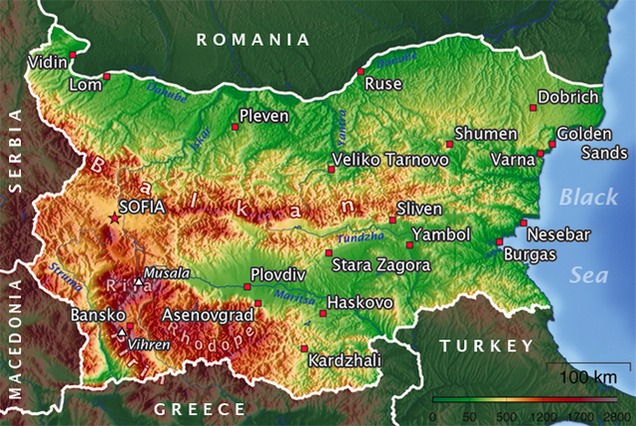Location, climate and nature
Bulgaria is situated in the southeastern part of Europe, on the continent’s border with Asia. It lies in the central part of the Balkans, neighboring with Romania from the north, Serbia and Macedonia from the west, Greece and Turkey from the south and Black Sea from the east.
The country’s area is only 111 000 sq km, equaling one of the smaller US states. Yet, Bulgaria has on its territory everything nature can offer including meadows, mountains, sea, valleys and rich historic background.
Its climate is moderate continental and some Mediterranean influence can be sensed in the southern part.
Many mountains shape Bulgaria’s silhouette. Rila and Pirin have alpine character. Stara Planina crosses the length of the country and the Rhodope Mountains impress with their huge forests.
Bulgaria has many rivers but most of them small and none navigable. This network of rivers is responsible for the fertile Bulgarian land. Many fruits and vegetables are grown in the country.
Many preserves and protected areas are situated inside the country. Some of the species growing and living there are very rare and can be seen nowhere else. Two bird migration routes pass over the territory of the country. These are Via Pontica and Via Aristotelis. This makes the country important for bird protection on a global scale.
History
The territory has been populated since ancient times. Archaeologists find each week new artifacts that tell old stories. Thracians, Greeks, Romans, Slavs and Bulgarians inhabited the region. Each group left its marks and affected the culture and genotype of contemporary Bulgarians.
Bulgaria’s population is slightly under eight million people today. The diversity of religious and ethnic groups and the tough situation in the country makes all these people peacefully leave together. Bulgaria is the home of Christians, Muslims, Jews, Catholics, Armenians and representatives of the Roma minority.
People in the country are proud of their history. Each country has its victories and downfalls. In the past, Bulgaria’s territory spread between three seas and it acted as an important state in Europe. Yet, the country was conquered twice. It fell under the control of the Byzantine and Ottoman empires and the second reign lasted nearly 500 years.
These five centuries were marked with bravery and Bulgarian attempts for freedom. After the liberation in 1878, young Bulgaria developed fast and managed to become an important actor on the Balkans once again.
Today Bulgarians are still dealing with the damages done by the 45 years of socialist rule. This period caused long-lasting economic and social problems.
Traditions and folklore
Bulgarian traditions date way back in time. Some of them have pagan origin, others are tied to religion and some rituals mix both. Probably one of Bulgaria’s most typical symbols is the martenitsa, a mascot of luck and health given on March 1. Foreigners wonder about and enjoy the ritual.
Koukeri is another local tradition, freeing people from evil powers in the beginning of each year.
Some of the most celebrated holidays in Bulgaria are Christmas and Easter. These two occasions bring families together and generations celebrate and unite. Once you travel, you will get a better feel of holidays and the way these are celebrated in different parts of the country. A number of rituals are specific only for certain Bulgarian areas.
Cuisine
Bulgarian cuisine is famous worldwide because of the local yoghurt and cheese production. Foreigners tend to love local dishes like shopska salad, minced meat balls (kiufte), kebapche, the specific drink of boza and dough dishes like mekitsi and banitsa. Fruits and vegetables are also of known quality. Bulgarians managed to keep agriculture away from genetic engineering and the production is still organic.
Drinks
Grape growing and wine production traditions in Bulgaria date back a long time. Grapes are grown in almost all regions and high-quality wine is produced in many places. Large part of the production is exported. Rakia production also has its traditions. This typical alcoholic drink is produced from various types of fruits and dinner tables rarely go without rakia.
Many other traditions, landmarks and dishes can be seen and tried in the country. When you travel, you will meet many people and will learn more about the Bulgarian hospitality. In most places, you will be offered typical local drinks and dishes.
We will try to offer specific and diverse information that will help you make your travel plans. You can read more about many places or if you have no ideas- you can select a destination according to your preferences.

